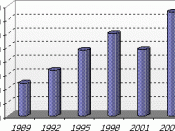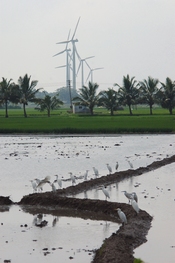With the WTO wave sweeping the country, the Indian chemical industries are now facing the threat of being swept off their feet. In India, the strategic decisions with regard to the investment in chemical projects have largely been made on the basis of the Indian demand or supply trends, which cannot be an appropriate strategy any more.
While, in future also, Indian demand trends would certainly influence the market in India, the supply scenario cannot be exclusively or largely from Indian sources. With the quantitative restrictions on imports being lifted, the source of imports can be anywhere ranging from the producing country or even from a trading centre. Unless the implication of this situation is appreciated by Indian industries in adequate manner, it could lead to serious flaw in decision-making that could prove to be costly in the long run.
While there have been lot of apprehensions about the impending problems, no worthwhile strategies have been initiated but only vague suggestions have been made.
In panic reaction, several Indian organisations are going slow on plans for diversification or expansion and are adopting a "Wait and Watch" attitude. In a desperate attempt to become global and multi- national, several Indian companies are readily coming forward to accept overseas organisation, taking care of even the day-to-day management of the units.
While the Initial reactions are one of panic and fear, the scenario appears to be one seeking desperate strategies. A careful analysis of the situation would reveal the fact that the conditions are really not as bad as it is being envisioned. Every region in the world has its own advantages and disadvantages with regard to the natural resources, traditional knowledge and talent level. However, readjustment of priorities is required by the native units, particularly when one has to operate in highly competitive conditions. This means that every country will have to focus on their areas of strength. Every country cannot make a product in a competitive way and selective choice of products for manufacture has become the subject of highest importance.
A careful study of the overall Indian resources scenario and likely product requirements in the coming years have to be made to clearly identify the focused area of investment. There are a number of areas and products where developed nations would find it difficult to set up any more new or additional capacities due to low technology factors and consequent absence of entry barriers for others or difficult environmental issues. Since the additional demand required for several products are likely to arise in Asian countries in the near future, it could even be uneconomical for developed countries to create project capacities for such products in their own land and transport them over long distance. In such conditions, it is seen that the developed countries are setting up facilities in the developing countries for manufacturing the products, instead of making them on their own.
While the need to enter the global market in a big way is well realised, there appears to be considerable apprehension and lack of confidence amongst the cross section of entrepreneurs and industry managers in India about their capability to do so, specially due to lack of quick response from the government.
Obviously, the basic necessity to compete in the global market would be the quality of the product output, cost of operation and ability to adhere to delivery schedule over a period of time, as well as the capacity to meet high quantitative demand for the product. While importance of technology factors should not be underestimated, competitiveness in the global market is possible for each country only in selected and appropriate areas of investment. Even when such approximate areas are carefully selected, penetration in the global market could pose problems, if not planned properly.
In this respect, one cannot but note that the Indian global marketing expertise is second to none. There is however, a strong need and urgent necessity to improve the global market intelligence and strengthen our trading houses.
Trading activity is no more a mere commercial exercise, but is intimately connected with technology inputs and consumer taste and also ecological issues. High quality technological and managerial inputs for trading activity are essential requirements for success.
Indian trading houses will have to become global in character and approach. This would call for not only expertise in capability, but also high investments. The feasibility of several Indian manufacturing and trading units joining together to set up global level trading houses has to be carefully examined






